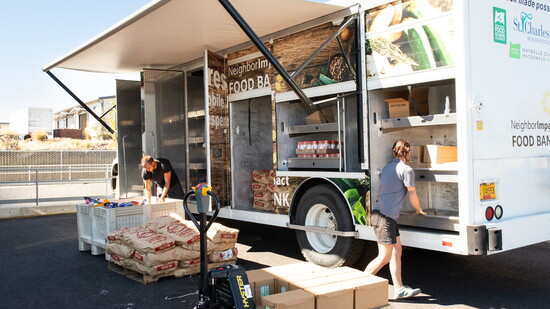Running a food assistance program these days is at times a lesson in making “Stone Soup.” Start with what you have and encourage community participation in order to make it something actually palatable and filling.
“I find out when I open my email,” says a frustrated Carly Auten, NeighborImpact Food Program Director, about the decrease in available food. “The usual order form is just suddenly missing items — important, nutritionally-rich items. The fresh vegetables and fruit and the meat,” she continues, “the items that are so expensive to purchase especially in our rural towns.”
Auten runs the Central Oregon region’s arm of the Oregon Food Bank through the nonprofit, NeighborImpact. NeighborImpact (NI), in operation since 1985, exists to represent and serve economically disadvantaged residents of Deschutes, Crook, and Jefferson counties and the Confederated Tribes of Warm Springs. Their mission is to support people and strengthen communities. Among their services are those that foster housing stabilization, offer Head Start/Early Head Start care and education, and provide food.
Partner organizations team up with the NI Food Program for access to Oregon Food Bank’s free or reduced cost food as well as for assistance in providing a safe, inclusive meal or pantry program. For the latter, NI Food Program representatives conduct an initial survey of the applicant nonprofit, offering guidance for food safety, staff and volunteer training, respectful operational guidelines, and more. Then, yearly, each organization is re-certified. Program staff stay current with best practices for efficient and effective distribution of food resources as well as the very human side of the work, things like meal preparation education and cultural food choice awareness.
Auten’s frustration is the result of Federal cuts to food aid programs. “It affects our entire region, yet, as with so many assistance programs, it affects our rural communities in an outsized way. Ranch and farm towns are getting double hit. Less assistance and less business through Federal contracts,” she adds.
Bryan Senner, the Food Pantry Coordinator at Nativity Lutheran Church reports that “the quantity of food we receive from NI has drastically changed. We used to get up to 3,000 pounds of food on a regular basis, now we are getting between 900 and 1,000 pounds. That means that we have less food to distribute, meaning less food for each household, and a greater cost for our congregation.”
At Family Kitchen, Operations Manager Tori Wild notes that upcoming cuts to fresh fruit will affect the nutritional value of the sack lunches they provide to Central Oregon Veterans Outreach (COVO) and the Taylor Center outreach program. “Without the free apples, pears, peaches, and grapes, we'll be unable to provide fruit in the 195 lunch bags distributed each week. While we've tried to fit purchasing fruit into our budget for these lunch bags, the expense is unfortunately outside of what we can manage.”
Yet, through challenges area food programs persist. At NeighborImpact, in addition to equitable distribution of resources to partner agencies, the program also operates a mobile food pantry to upwards of 18 locations per month and 4,000 people served. Auten started the mobile pantry program to provide food to areas that don’t currently have a pantry or meal program. It’s a nimble solution, allowing test runs and data collection while helping a community often overlooked. An added benefit has been the ability to introduce people to fresh foods they may not usually encounter or be able to afford.
“Bok choy was a new concept for many,” says Jordan Reeher, Food Bank Manager “We’ll get something like that in pallets and it can take a bit to convince people to try it. Yet we know it has high nutritional value. Staff will test recipes and then we’ll hand those out with the food distribution. People let us know that they’ve tried the recipes and it gets easier over time to introduce lesser-known produce.”
The mobile pantry program has had to scale back a bit with the recent cuts - no longer offering pop-ups on the 5th Wednesdays and Fridays of the month and eliminating one of the regular stops in Redmond. Auten and Reeher plan to work to make sure the rest of the program can stay steady.
When asked what he hopes readers can know about food assistance programs, Reeher responds, “I wish that everyone could see the real people and their real need. The growing perspective that food pantries are serving lazy people is out there and being “fed” by our current system of misinformation.”
It’s hard enough to seek assistance, yet it’s increasingly necessary. As a community, we can do better by getting involved and knowing more about food insecurity. In fact, 12.1% of the people living in Deschutes County* are food insecure. That is a constant, exhausting burden to bear.
NeighborImpact.org
*Feeding America statistic from 2023 www.feedingamerica.org
Want to Help?
- Host a ‘Free the Food’ yellow bag site at your business! Visitors/customers can take a yellow bag, fill it, and bring it back to you. The Food Bank team will pick up donations. It drives repeat foot traffic while helping the community! Contact Jordan Reeher, jordanr@neighborimpact.org
- Pick up a ‘Free the Food’ yellow bag at a participating business and provide high nutritional value foods (unexpired non-perishable food items, with emphasis on canned soups, peanut butter, and canned fruits and vegetables.)
- Schedule a monthly financial donation specifically for food. Go to neighborimpact.org and follow the ‘donate’ prompts, specifying the food program. A monetary donation serves more people than a food donation.
- Volunteer for the mobile pantry or other partner food agencies! Here you will learn more about the real need across our region.
- Consider the full breadth of the effect of your powerful vote. Engage with your local elected representatives and work with them to raise the issues important to our area.
